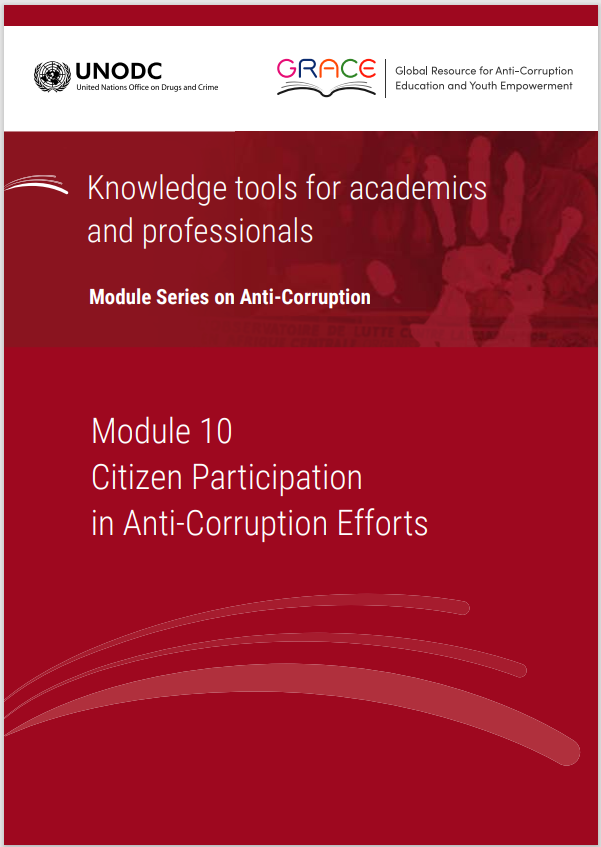This module is a resource for lecturers
Guidelines to develop a stand-alone course
This Module provides an outline for a three-hour class, but there is potential to develop its topics further into a stand-alone course. The scope and structure of such a course will be determined by the specific needs of each context, but a possible structure is presented here as a suggestion.
|
Session |
Topic |
Brief Description |
|
1. |
Overview: How can citizens participate in the fight against corruption |
This should discuss issues like the meaning of "citizen", the rights and responsibilities of citizens and the relationship between active citizenship and good governance. The session should highlight the history of citizen participation in democracy and how citizen engagement has changed in modern times. The lecturer should cover the open data movement and the implications that it had on citizen participation in the fight against corruption. Resources: The Antidote to Apathy |
|
2. |
Collective action against corruption |
This session can look at the issue of collective action against corruption. Based on the premise that corruption is a problem of the collective, efforts to address corruption also have to be collective. Collective action is based on the idea that the private sector, civil society and the public sector work jointly together to provide solutions to domestic corruption problems. Resources could include UN Global Compact, A Practical Guide to Collective Action against Corruption (2015). |
|
3. |
The role of the media and investigative journalism |
This class should provide detailed information on the history of investigative journalism, the approaches taken by journalists in recent years to uncover corruption - collaborative, multi-jurisdictional and the impact these efforts have had on corruption globally. Topics should include the Mossack Fonseca Papers, Paradise Papers, and Wikileaks among others. |
|
4. |
The role of social media in the fight against corruption |
Social media has been used as a tool to highlight various wrongdoings, including corruption. How have platforms like Twitter and Facebook been used in the fight against corruption? Are there any drawbacks to this? How do the corrupt use social media and how can this be counteracted. A case study can be Bell Pottinger's " white monopoly capital" social media campaign that was financed by corrupt elites in South Africa to distract the public from the corruption and state capture that was being perpetuated. |
|
5. |
Citizen journalism and the benefits for anti-corruption |
Students can watch the TED Talk on Citizen journalism and from there engage in a discussion on what citizen journalism means and the implications of this for anti-corruption. |
|
6. |
Citizen journalism and the detriments |
Class discussion on the detriments of citizen journalism - fake news, trial by the media and the impact of unverified reports on the lives of the subjects. How can these issues be addressed in an unregulated space? Does mainstream media have a role in ensuring responsible and ethical citizen journalism? |
|
7. |
Game changers in anti-corruption |
This class should focus on individuals and organizations who have made a significant impact on the fight against corruption. The lecturer can select two examples and study their profile in class and end with a discussion of what was done right and what mistakes were made and what lessons can be learned from the stories of the selected persons. For instance, the discussion could focus on international examples with global impact on anti-corruption and local actors relevant to the country of study. |
|
8. |
Transparency and Open Government |
This class can focus on the role of transparency, access to information and open data in anti-corruption efforts. The session should also examine the founding objectives of the open government movement as well as the connection between the concept of open government, citizen participation and corruption. |
|
9. |
Big data as a tool in the fight against corruption |
This class can discuss the idea of big data and how it can be used to highlight corruption trends and patterns to provide contextualized solutions and reforms. |
| 10. | Blockchain as a tool to fight corruption |
Blockchain has been presented as a panacea to address issues of transparency, traceability, compliance, flexibility and stakeholder management in private sector supply chain management. What potential uses can it have in the public sector? There are already many blockchain-based applications in relation to land registration. The Dubai Blockchain Strategy 2020 is a project where Dubai intends to move all government services to a blockchain platform by 2020. This class could examine some of the test cases of blockchain such as those available here and determine whether it may provide solutions to corruption in areas like public procurement. |
 Back to top
Back to top
